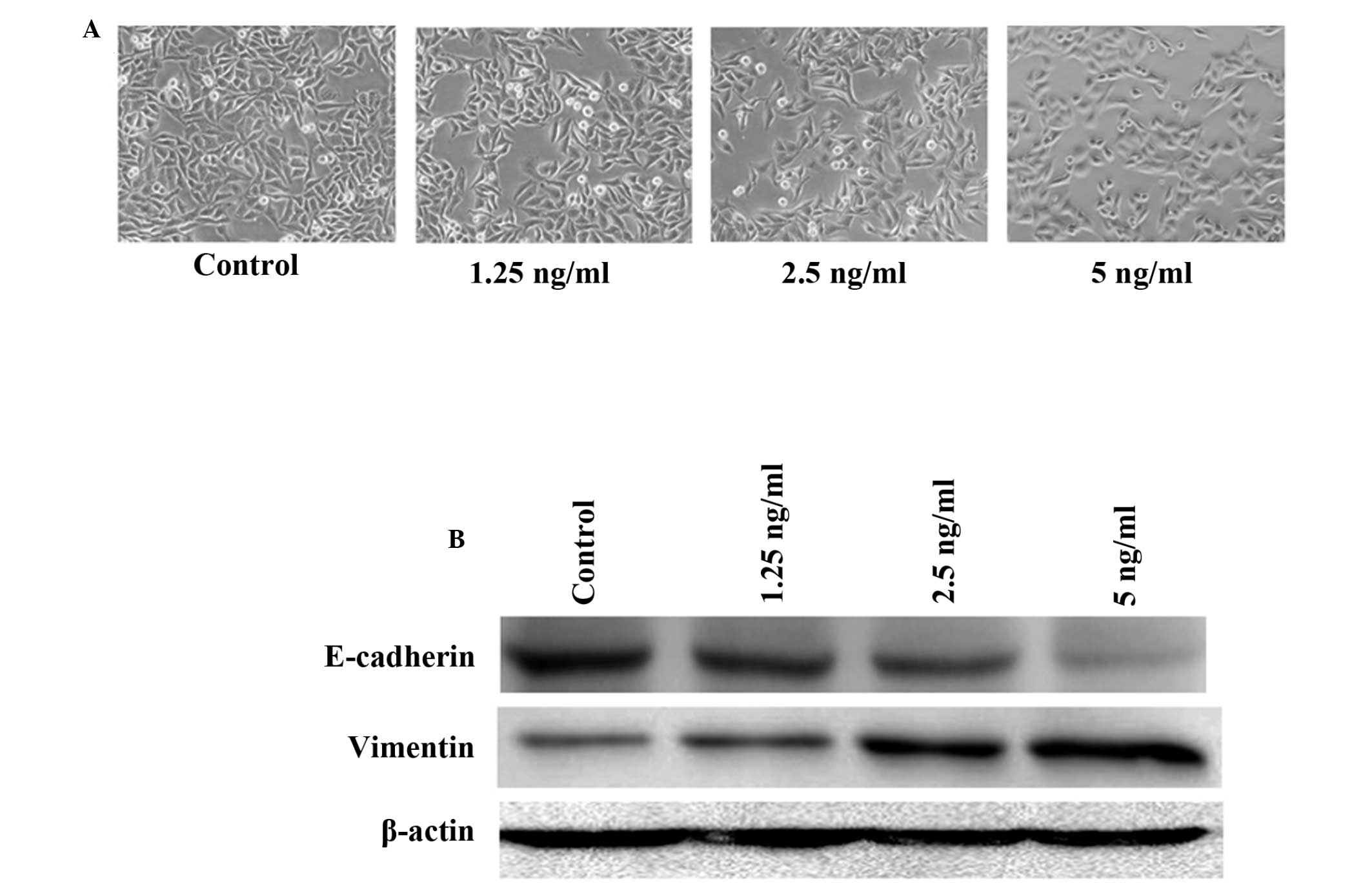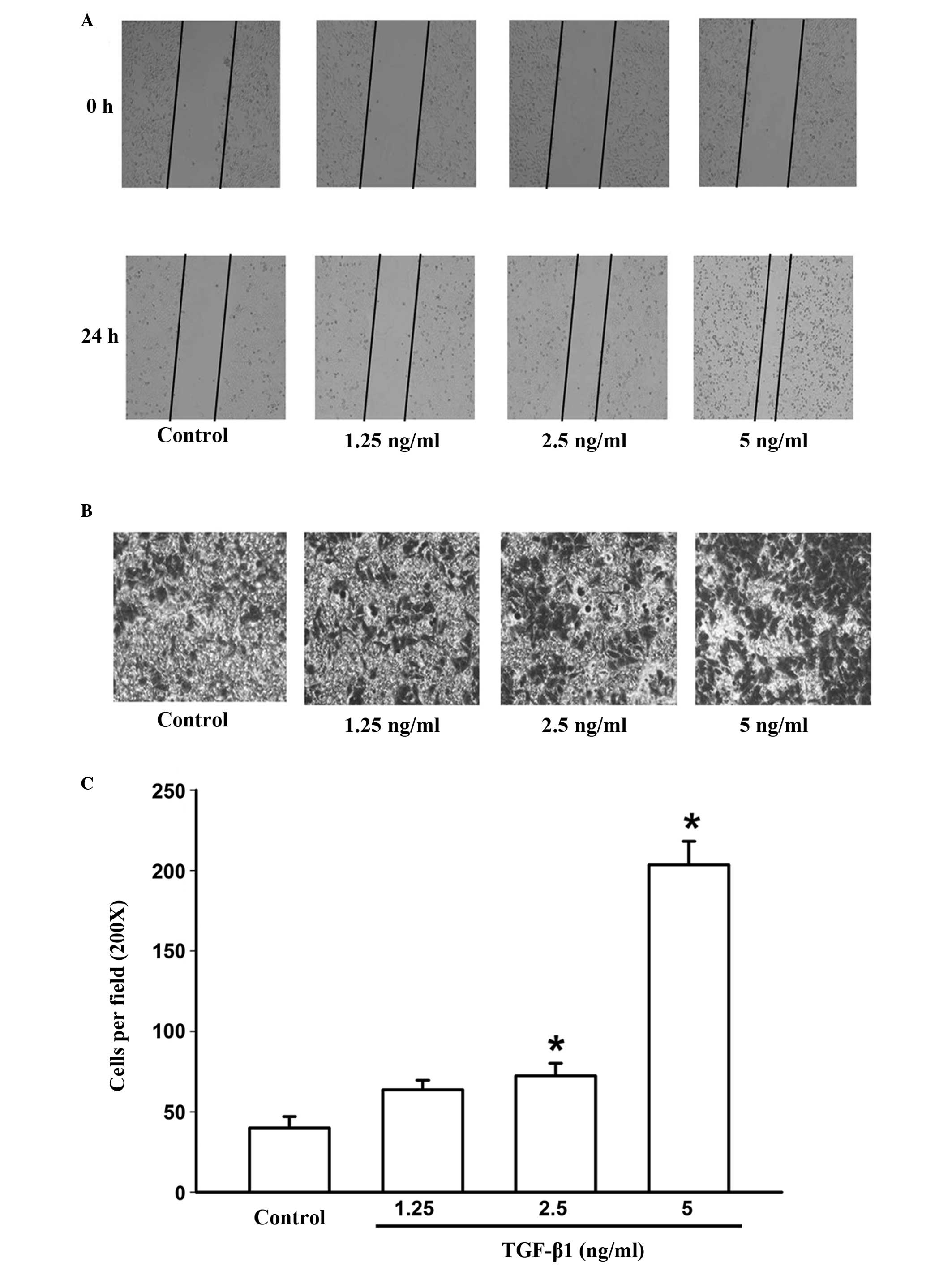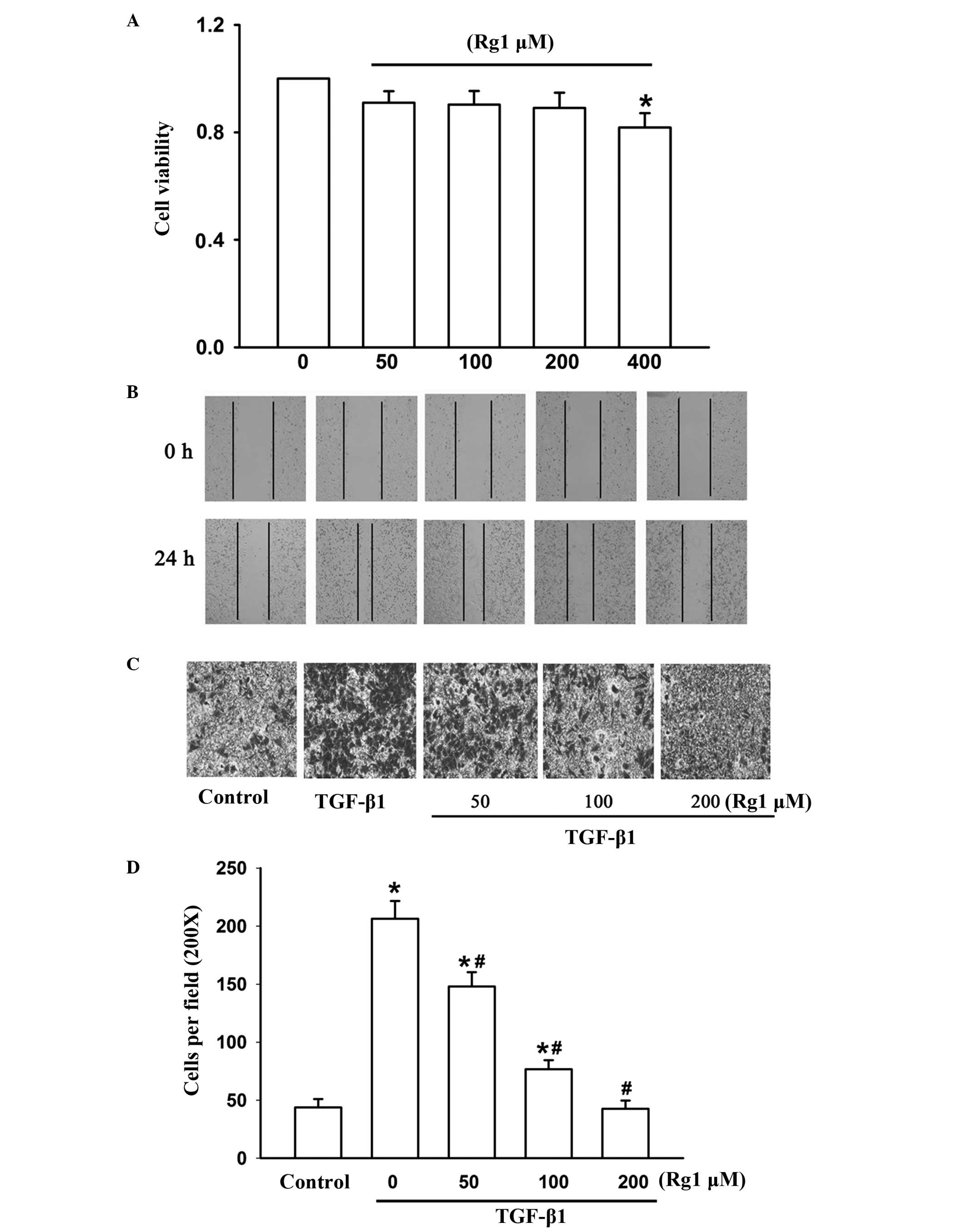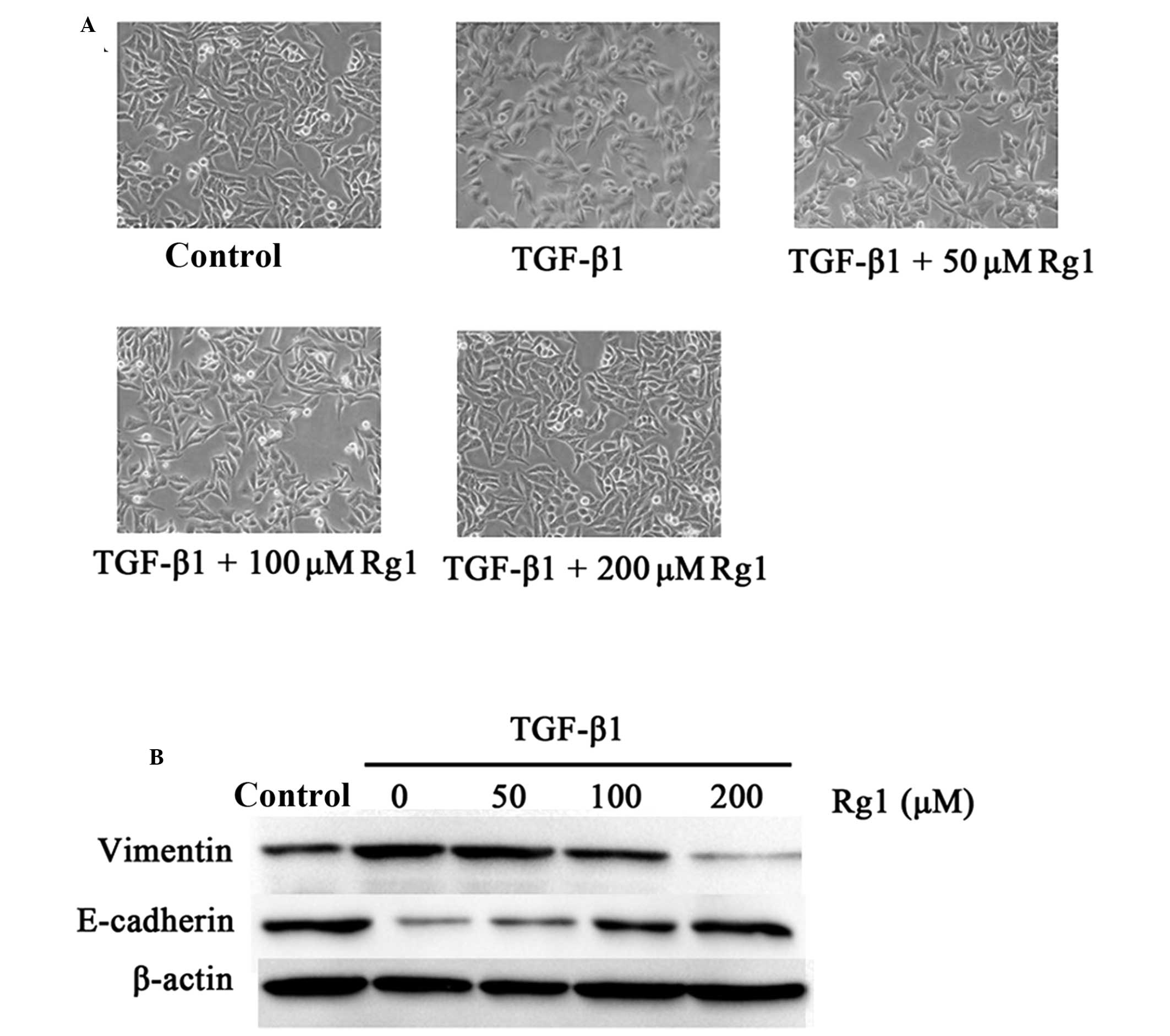|
1
|
Jemal A, Murray T, Ward E, et al: Cancer
statistics, 2005. CA Cancer J Clin. 55:10–30. 2005. View Article : Google Scholar : PubMed/NCBI
|
|
2
|
Chaffer CL and Weinberg RA: A perspective
on cancer cell metastasis. Science. 331:1559–1564. 2011. View Article : Google Scholar : PubMed/NCBI
|
|
3
|
Hanahan D and Weinberg RA: Hallmarks of
cancer: the next generation. Cell. 144:646–674. 2011. View Article : Google Scholar : PubMed/NCBI
|
|
4
|
Chang CJ, Chao CH, Xia W, et al: P53
regulates epithelial-mesenchymal transition and stem cell
properties through modulating miRNAs. Nat Cell Biol. 13:317–323.
2011. View
Article : Google Scholar : PubMed/NCBI
|
|
5
|
Thiery JP, Acloque H, Huang RY, et al:
Epithelial-mesenchymal transitions in development and disease.
Cell. 139:871–890. 2009. View Article : Google Scholar : PubMed/NCBI
|
|
6
|
Voulgari A and Pintzas A:
Epithelial-mesenchymal transition in cancer metastasis: mechanisms,
markers and strategies to overcome drug resistance in the clinic.
Biochim Biophys Acta. 1796:75–90. 2009.PubMed/NCBI
|
|
7
|
Lee JM, Dedhar S, Kalluri R, et al: The
epithelial-mesenchymal transition: new insights in signaling,
development, and disease. J Cell Biol. 172:973–981. 2006.
View Article : Google Scholar : PubMed/NCBI
|
|
8
|
Zavadil J and Böttinger EP: TGF-beta and
epithelial-to-mesenchymal transitions. Oncogene. 24:5764–5774.
2005. View Article : Google Scholar : PubMed/NCBI
|
|
9
|
Yang J and Weinberg RA:
Epithelial-mesenchymal transition: at the crossroads of development
and tumor metastasis. Dev Cell. 14:818–829. 2008. View Article : Google Scholar : PubMed/NCBI
|
|
10
|
Attele AS, Wu JA and Yuan CS: Ginseng
pharmacology: multiple constituents and multiple actions. Biochem
Pharmacol. 58:1685–1693. 1999. View Article : Google Scholar : PubMed/NCBI
|
|
11
|
Lee EJ, Ko E, Lee J, et al: Ginsenoside
Rg1 enhances CD4(+) T-cell activities and modulates Th1/Th2
differentiation. Int Immunopharmacol. 4:235–244. 2004. View Article : Google Scholar : PubMed/NCBI
|
|
12
|
Li CY, Deng W, Liao XQ, et al: The effects
and mechanism of ginsenoside Rg1 on myocardial remodeling in an
animal model of chronic thromboembolic pulmonary hypertension. Eur
J Med Res. 18:162013. View Article : Google Scholar : PubMed/NCBI
|
|
13
|
Li QF, Shi SL, Liu QR, et al: Anticancer
effects of ginsenoside Rg1, cinnamic acid, and tanshinone IIA in
osteosarcoma MG-63 cells: nuclear matrix downregulation and
cytoplasmic trafficking of nucleophosmin. Int J Biochem Cell Biol.
40:1918–1929. 2008. View Article : Google Scholar : PubMed/NCBI
|
|
14
|
Liu J, Cai SZ, Zhou Y, et al: Senescence
as a consequence of ginsenoside rg1 response on k562 human leukemia
cell line. Asian Pac J Cancer Prev. 13:6191–6196. 2012. View Article : Google Scholar : PubMed/NCBI
|
|
15
|
Liu Q, Kou JP and Yu BY: Ginsenoside Rg1
protects against hydrogen peroxide-induced cell death in PC12 cells
via inhibiting NF-κB activation. Neurochem Int. 58:119–125. 2011.
View Article : Google Scholar
|
|
16
|
Qu DF, Yu HJ, Liu Z, et al: Ginsenoside
Rg1 enhances immune response induced by recombinant Toxoplasma
gondii SAG1 antigen. Vet Parasitol. 179:28–34. 2011. View Article : Google Scholar : PubMed/NCBI
|
|
17
|
Xu L, Chen WF and Wong MS: Ginsenoside Rg1
protects dopaminergic neurons in a rat model of Parkinson’s disease
through the IGF-I receptor signalling pathway. Br J Pharmacol.
158:738–748. 2009. View Article : Google Scholar : PubMed/NCBI
|
|
18
|
Li L, Wang Y, Qi B, et al: Suppression of
PMA-induced tumor cell invasion and migration by ginsenoside Rg1
via the inhibition of NF-κB-dependent MMP-9 expression. Oncol Rep.
32:1779–1786. 2014.PubMed/NCBI
|
|
19
|
Ellenrieder V, Hendler SF, Boeck W, et al:
Transforming growth factor beta1 treatment leads to an
epithelial-mesenchymal transdifferentiation of pancreatic cancer
cells requiring extracellular signal-regulated kinase 2 activation.
Cancer Res. 61:4222–4228. 2001.PubMed/NCBI
|
|
20
|
Chen J, Li Q, An Y, et al: CEACAM6 induces
epithelial-mesenchymal transition and mediates invasion and
metastasis in pancreatic cancer. Int J Oncol. 43:877–885.
2013.PubMed/NCBI
|
|
21
|
Creighton CJ, Gibbons DL and Kurie JM: The
role of epithelial-mesenchymal transition programming in invasion
and metastasis: a clinical perspective. Cancer Manag Res.
5:187–195. 2013. View Article : Google Scholar : PubMed/NCBI
|
|
22
|
Polyak K and Weinberg RA: Transitions
between epithelial and mesenchymal states: acquisition of malignant
and stem cell traits. Nat Rev Cancer. 9:265–273. 2009. View Article : Google Scholar : PubMed/NCBI
|
|
23
|
Thiery JP and Sleeman JP: Complex networks
orchestrate epithelial-mesenchymal transitions. Nat Rev Mol Cell
Biol. 7:131–142. 2006. View
Article : Google Scholar : PubMed/NCBI
|
|
24
|
Nagai T, Arao T, Furuta K, et al:
Sorafenib inhibits the hepatocyte growth factor-mediated epithelial
mesenchymal transition in hepatocellular carcinoma. Mol Cancer
Ther. 10:169–177. 2011. View Article : Google Scholar : PubMed/NCBI
|
|
25
|
Shin JA, Hong OK, Lee HJ, et al:
Transforming growth factor-β induces epithelial to mesenchymal
transition and suppresses the proliferation and
transdifferentiation of cultured human pancreatic duct cells. J
Cell Biochem. 112:179–188. 2011. View Article : Google Scholar
|
|
26
|
Yang JJ, Lim JY, Huang J, et al: The role
of inherited TPMT and COMT genetic variation in cisplatin-induced
ototoxicity in children with cancer. Clin Pharmacol Ther.
94:252–259. 2013. View Article : Google Scholar : PubMed/NCBI
|
|
27
|
Li J, Wei Q, Zuo GW, et al: Ginsenoside
Rg1 induces apoptosis through inhibition of the EpoR-mediated
JAK2/STAT5 signalling pathway in the TF-1/Epo human leukemia cell
line. Asian Pac J Cancer Prev. 15:2453–9. 2014. View Article : Google Scholar
|


















